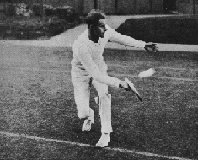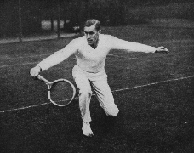|
TennisOne Lessons
Bill Tilden and the Classical Vision, Part Three: First Principles
by Kim Shanley, TennisONE Editor and Publisher Tilden's vision included the classicist's deep appreciation for the past. There are some very valuable things of the past that have been lost in the wild scramble for speed and power. These should be recovered and brought back into the repertoire of the modern player....The champion of today owes his game to the champions of yesterday, just as he will add his bit to the champion of tomorrow.
So what can we learn from Bill Tilden? First, it might be a good idea to re-establish Tilden's credentials. In a 1950 Associate Press poll of 391 sports writers, Tilden was voted as the greatest tennis player of all-time. Such was Tilden's dominance in the minds of these sports writers that Tilden received 310 votes, while his closest rivals, Jack Kramer and Don Budge, received only 32 and 31 votes respectively. What we can learn from Tilden is a deeper understanding of the first principles of tennis, the principles that underlie all strategy and tactics. Tennis is a Difficult Sport Though he was a master at the game, Tilden had a deep appreciation for the difficulty of playing tennis. If he is a complete beginner, I tell him frankly it will take him a least twenty lessons before he has enough of a game to start to play. I also tell him that it will be about six months before he reaches a point where he gets much real fun out of playing.... Why did Tilden think tennis was so difficult? Tilden never neatly sums up the issue, but extrapolating from numerous scattered comments, I think Tilden would agree with the view that there is an inherent Certain sporting tasks are inherently more biomechanically difficult than others. For example, hitting a baseball thrown at 90 m.p.h. and placing it between nine defensive fielders is inherently more difficult than, say, catching a flyball, a task which is completed successfully nearly 100 percent of the time. In fact, the best hitter of all-time in terms of batting average, Ty Cobb, only had a lifetime batting average of .367 (a successful completion rate of slightly higher than one out of three). In the range of sporting activities, successfully hitting a tennis ball back over the net and into the proscribed area on the other side (given the whole range of variables, including ball speed and spin, body movement, and wind and sun) is an inherently difficult task. "Remember," Tilden says repeatedly, "that in first-class tournament tennis, 70 percent of all points end in error, a net or an out, and only 30 per cent end in winning placements or service aces." The inherent difficulty of tennis underlies Tilden's most basic strategic advice Keep the ball in play and give your opponent another shot at it, rather than risk an error by taking an unnecessary chance. While Tilden's advice doesn't seem to have influenced such modern tennis coaches as Nick Bollettieri (see Part 2 of this series), one of the best modern tennis strategists, Allen Fox, echoes Tilden's perspective when he says, "Tennis is a game of errors." The Scoring System Adds Difficulty The scoring system in tennis adds even more difficulty to an already difficult sport. Why? Because tennis' scoring system adds extra pressure on big points. Though every point theoretically counts the same in tennis, some points--the points to win (or lose) crucial games and sets--are vastly more important than others. It is quite possible to lose more points than you win, and still win the match--if you win the big points in the crucial games. This added pressure on the big points makes it even more difficult for the average human being to execute a perfect shot--or a winner in tennis's parlance--than a safe, high percentage shot. The Importance of Momentum and Confidence Given the difficulty of executing a difficult task under pressure, Tilden has a deep appreciation for the intangible factors of momentum and confidence. "Nothing is so disconcerting or upsetting to a player as to miss....," says Tilden. "The more errors he makes, the less likely are his chances of pulling his game together on subsequent points." This leads to Tilden's second major piece of strategic advice: The primary object in match tennis is to break up the other man's game...The first thought that you should have, when you step onto a court for a match, is "What are my opponent's weaknesses? Where will he miss most?" Again, you can see Tilden's influence in Allen Fox's thinking when Fox advises modern students of the game to "break down the structural integrity of your opponent's game while retaining your own." |


 biomechanic difficulty to playing tennis.
biomechanic difficulty to playing tennis.